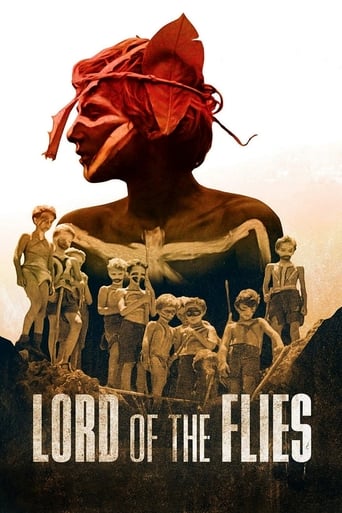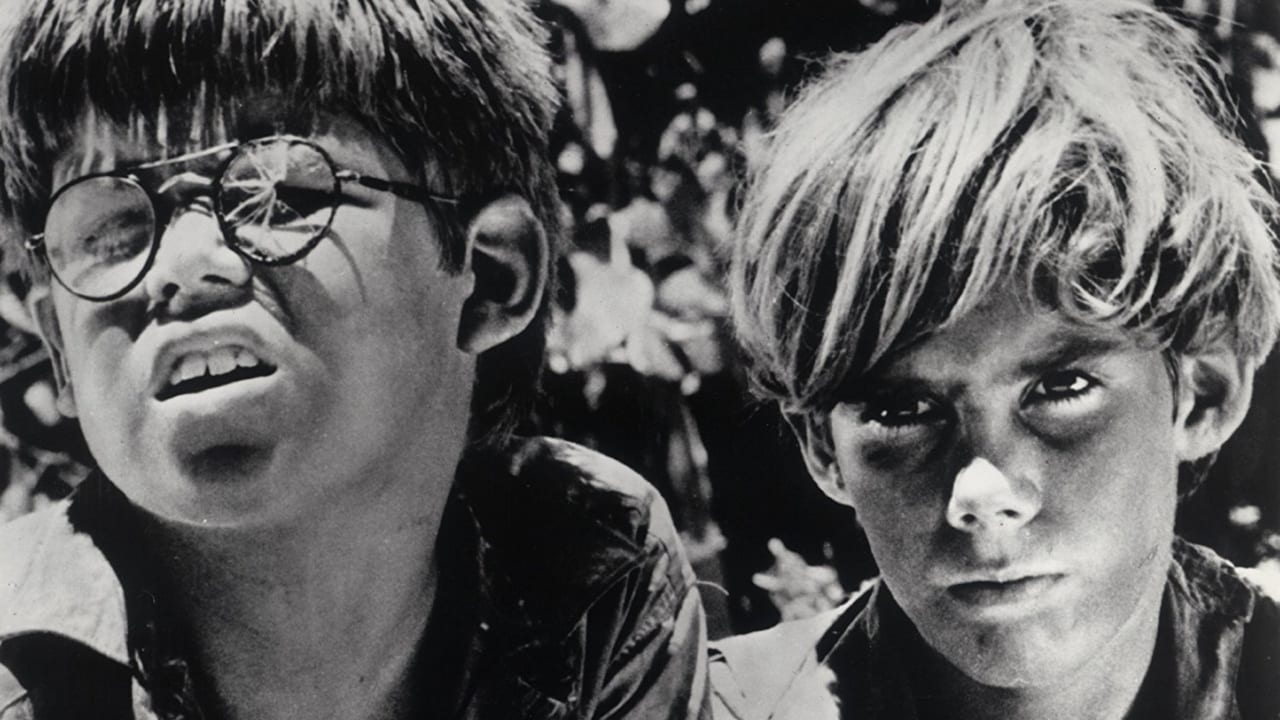Kirpianuscus
It is one of my favorit novels. because it remains the fundamental map for define the childhood, the dictatorship, the demons living in us, the temptation, the cold and hot, in same mesure, cruelty. and the adaptation of Peter Brook represents the inspired one. first, for the great cinematography . second - for lovely reflection of the essence of Wiiliam Golding masterpiece. not the last, for the performances. you feel each line of novel in this film, in its original sound and flavor and tension. you discover, again, the powerful message of the novelist. his fears. and his pesimistic perspective about the evil and its "freshness" of childre. entire universe of shadows and cruelty is reflected in the art of Peter Brook. and scene by scene I remind the period of high school when I was first time front to this magnificent book . it is an useful film. and this fact is only real important thing. for see the world from the right angle. for create, like me, a solid imafe about the demons inside us. and for become sincere. about yourself. about the others.
dpaterson-2
Fifty some years later, this Golding film is a reminder of the bankruptcy of England's understanding of itself. As one of the 3-4 greatest colonial countries of post-Middle Ages Europe, we would think the genocidal policies of Europe in various "new worlds" would have caused educated, intelligent people to ask questions about that history. Here we have an England that slaughtered and conquered and enslaved Africans and inflicted incalculable damage on Caribbeans, North American indigenous, Australian indigenous, and Asian cultures. But in this film book of 1954 and film of 1963, neither Golding nor Brook can see the way clear to including a single child of color. Why? Because apparently the issue of genocide and centuries of terror is a matter for white folk to decide.The Golding story is a British bourgeois wet dream of the failure to "civilize" the savage world, enacted of course by all white historical actors.To be precise here, Golding imagines here and in other works that there lurks in the uncivilized a murderous savagery that can only be corralled by western civilization. Regrettably, western civ has been too weak, too uncertain, and too incompetent to truly finish the world-caging task.Had Golding, and Brook, read something besides British self-congratulatory histories and seen something besides white "civilizing" westerns, they might have noticed that the true savagery of the last 600 years, or even last 2500 if we want to be a little comprehensive, originated in Europe. Always. And then Europe proceeded to genocide the world, only to find in 1930 the chickens had come home to roost. That the evil inherent in European supremacist values and social structures had faced off in Europe's very viscera. It refined its millennia of fascist practice and proceeded to genocide itself.That history, that euro-characteristic of supremacy -- supremacy of religion, of color, of culture, of gender, of values -- was the cause of it's even as yet unrestored, unreparationed evil. The very conception of The Lord of the Flies is a confident moralizing that at least a couple of white euro-men know the secret of evil. When, at least in 1954 and 1963, they hadn't the vaguest clue about their origins, but were in fact, stranded boys wandering in the arts, perpetuating the mythologies that wove back at least to "renaissance" Europe, or to fascist Rome, or to hypocritically un-"democratic" Greece, and indeed to the whole notion of "civilization" itself.It would have been instructive if Goldling and Brook had at some time tried to research the deep history of human tribes, how we lived for 40,000 years before the urbanization, which we call civilization, began. It was certainly the rulers and thinkers and "artists" and armies of "civilization" that destroyed tribes where ever they went. Perhaps, had they listened, they might have learned something about what it means to be a be a human being on this planet.
SkyOutlet
Lord of the Flies (1963) is the type of movie that only comes around every decade or so. It's a film that perfectly relays the message of the source material without being too preachy. This film was released in 1963, 20 years after the release of color TV and film. The use of black and white film as opposed to color was a choice made by director Peter Brooks to keep the focus on the story as opposed to the visuals. In a world of film where flashy explosions and dazzling visuals take precedence over the story, Lord of the Flies is a breath of fresh air. Take Avatar (2009) for example. The story took a backseat to the revolutionary visuals. Lord of the Flies' visuals may not look very appealing to the modern day viewer, but they excel in invoking emotion and telling the story.The purpose of this film was not to entertain but to relay the message that Golding pushed in Lord of the Flies. Take the deaths of Piggy and Simon for example. Both had extremely graphic deaths in the book, but this wasn't carried over to this film. Instead, Brooks None of the boys in this film were experienced actors. They were chosen for their likeness to the individual characters. The only complaint I have with this film is that it didn't recognize the amount of time that passed while they were on the island. According to Golding himself, the book took place over the course of three months. According to Brooks, the story takes place over a long weekend. This led to the removal of several key symbols that heavily contributed to the book. However, considering the era in which this movie was made, it's easy to see how they couldn't portray this. I also wished they included the dialogue between Simon and the Beast, but again this was a conscious choice by Brooks to keep the dialogue internal. If you have read this book, and wish to see a film version, I highly recommend this one over the 1990 version.
Steve Pulaski
William Golding's timeless novel Lord of the Flies is one of the many works of literature that has continuously etched itself into the English reading curriculum, much like Harper Lee's To Kill a Mockingbird and William Shakespeare's Romeo and Juliet. Golding's novel isn't a racial parable or a story about star-crossed lovers, but a dark, biblical allegory with a message about as crippling and as thought-provoking as anyone I can think of. It's not an easy read, with lots of imagery spelled out in grand detail and a plethora of ambiguous symbolism. And for that matter, it's not a very easy watch. One must go in prepared and open-minded to truly enjoy what Peter Brook's Lord of the Flies brings.The story is simple. After a horrific plane crash, a group of young schoolboys are left stranded and ill-equipped to try and sustain themselves on a remote island surrounded by water as far as the eye can see. There are no adults, the pilot is dead, and their home country of England is now involved with what will be known as World War II. We are first greeted with plucky young Ralph (Aubery), who will later become selected leader of the island, with his leadership resembling a fair and balanced democracy. Ralph's best friend on the island is a chubby boy named Piggy (Edwards), who remains realistic about the situation that the boys will be condemned to this island until they die.Another boy on the island named Jack (Chapin), quickly embraces life on the island, and turns to barbaric and savage intentions as the antagonist whose only care is to hunt and kill. He becomes symbolic for Satan, while another boy named Simon (Gaman) becomes almost a Christlike figure, with his excessive assistance to the boys and authentic kind nature.The moral of the novel and film is quite interesting, and is open for some heavy debate. Golding states that the only reason humans are kept in place and are civilized is because of law and order, and if those laws were ever to be lifted at any given time, that at first, people would try to remain civil, but would soon become virtually consumed by their savage instincts. We act on our superego, meaning we do what we believe is right, and if laws didn't exist, we'd most likely act on our id, our impulsive inner-evil if you will. Over the course of the film, it seems like in no time these once well-kept, collective children are consumed by their own inner-desires to act on impulse and not fear any consequences at all. This makes for a very unsettling picture, especially in the last half-hour when some unthinkable scenes occur.Hook's direction sets up a consistently tense and very detailed atmosphere. The cinematography is also commendable, only complimented by the dreary silence because of the choice to omit any formal music. Hook manages to incorporate some rather tricky tracking shots, and some birds-eye shots that are difficult to successfully pull off. Apparently, the film was shot on an island in Puerto Rico, and very little scripting was done. Much of the dialog is improvised, which works for and against the film simultaneously. There is a great feeling of authenticity when a film or show is improvised, but here, the children, all of them I believe to be first time actors with some never even returning to film again, recite their lines in a strange, unnatural way, which takes time to get used to. It provides inevitable corniness, but thankfully, can't derail the entire film all together.Not to mention, the pacing feels a little off. Sometimes, long periods of silence go on, and we are unsure of where the film is going. Although a little odd, it provides time for the cinematography and atmosphere to take effect, projecting a feeling of dread and uncertainty. Throughout the film and the novel, the boys are fearing, what they call "the beast," which refers to the unknown on the island. The boys constantly believe some creature is out to get them, and this fear consumes them, much like their feelings of barbarism and savagery. This is where the film begins to hit home. What kid didn't dream of living by his own rules, in a place where he/she could do and say whatever they wanted? It isn't until that dream becomes a reality do we begin to regret our wish. The true tragedy is these boys didn't wish for this.Lord of the Flies was a challenge to adapt to film, and director Peter Brook clearly accepted it with gratitude and honor. He has great respect for Golding's original work, keeping the biblical theology and references in place, and rarely tampering the original events, making this a successful adaptation. I still feel the need to reiterate the fact that the phrase "the book is always better than the movie" is a void statement, seeing as the film adaptation can never be truly everything you wanted it to be. This is because the film is based off the director and/or screenwriter's interpretation of the story. As far as that works, Brook's is on par with mine, but perhaps the more important question is, is it on par with yours? Starring: James Aubrey, Tom Chapin, Hugh Edwards, and Tom Gaman. Directed by: Peter Brook.



 AD
AD





